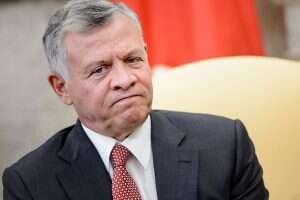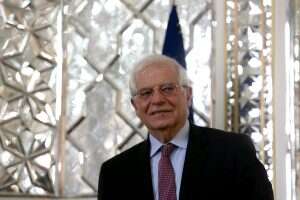by Eldad Beck , Daniel Siryoti , Ariel Kahana and AP
Commenting on the pressure already mounted on Israel by the international community to refrain from applying sovereignty in Judea and Samaria, Israeli Ambassador to the UN Danny Danon says that just as Israel "has been able to handle the international community's pressure in the past and we will know how to do so in the future."
Israeli Ambassador to the UN Danny Danon said over the weekend that "the Israeli government's decision about applying sovereignty [to parts of Judea and Samaria] will be coordinated with the US."
Commenting on the pressure already mounted on Israel by the international community to refrain from the move, Danon noted that just as Israel "has been able to handle the international community's pressure in the past and we will know how to do so in the future."
Many in the international community view Israel's settlement enterprise as being in violation of international law, and have warned that annexation could spell the end of the long-stalled peace process by making it virtually impossible to establish a viable Palestinian state.
US President Donald Trump's Middle East peace plan, introduced in January, gave a green light to annexation, US officials have reputedly stressed that pursuing the move was, ultimately, solely an Israeli decision.

"Leaders who advocate a one-state solution do not understand what that would mean," King Abdullah told German magazine Der Spiegel.
"What would happen if the Palestinian National Authority collapsed? There would be more chaos and extremism in the region. If Israel really annexed the West Bank in July, it would lead to a massive conflict with the Hashemite Kingdom of Jordan," he said.
Jordan is a close Western ally and one of only two Arab states to have signed a peace treaty with Israel. Abdullah declined to say whether annexation would threaten that agreement.
"I don't want to make threats and create an atmosphere of loggerheads, but we are considering all options. We agree with many countries in Europe and the international community that the law of strength should not apply in the Middle East," the monarch said.
Meanwhile, European Union foreign ministers agreed on Friday to step up diplomatic efforts to try to head off such a move.
At a video-conference, EU foreign ministers reaffirmed their support for a two-state solution and opposition to any annexation. The ministers, whose countries are deeply divided in their approach to Israel, agreed to ramp up diplomatic efforts in the coming days with Israel, the Palestinians, the United States, and Arab countries.
"We reaffirm our position in support of a negotiated, two-state solution. For this to be possible, unilateral action from either side should be avoided and, for sure, international law should be upheld," EU foreign policy chief Josep Borrell said after chairing the meeting.
"We must work to discourage any possible initiative toward annexation," Borrell told reporters in Brussels. "International law has to be upheld. Here, and there, and everywhere."
He made no mention of the use of sanctions, saying only that the EU will use "all our diplomatic capacities in order to prevent any kind of unilateral action."
The EU has long been committed to a two-state solution based on the 1967 lines, with the possibility of mutually agreed land-swaps.
"In our opinion, annexation is not compatible with international law," German Foreign Minister Heiko Maas said Friday. "From our point of view, changes to borders must, if at all, be the result of negotiations and happen in an agreement between both sides."
Jordan has been lobbying the EU to take "practical steps" to make sure annexation doesn't happen.

Also over the weekend, a senior US State Department official said that Israel's future plans to annex parts of the West Bank should be part of discussions between Israel and the Palestinians on the Trump administration's peace plan.
During a phone briefing with Israeli reporters, US State Department chief spokesperson Morgan Ortagus said, Pompeo "said that annexation is up to Israel. … We think these discussions should be a part of the peace process, part of President Trump's Vision for Peace. So it should be part of discussions between the Israelis and the Palestinians. I don't really have much more to say on it than that."
Asked whether Israel still has a "green light" for unilateral annexation, especially since the Palestinians are proving "unwilling to consider the Trump peace plan," Ortagus said that the US has put out a "comprehensive peace plan … We're going to continue to push for this vision for peace that the president has. We have certainly by no means given up hope. In fact it will continue to be a major part of our foreign policy to press for the Palestinians to come to the table as a part of this peace plan, as a part of this process.
"There is a mapping committee that is led by Ambassador Friedman. And so I don't have anything new to announce today other than just to reiterate the fact that all of these discussions relating to mapping and annexation we firmly believe should be a part of discussions between the Israelis and Palestinians working toward President Trump's vision for peace."
Eldad Beck , Daniel Siryoti , Ariel Kahana and AP
Source: https://www.israelhayom.com/2020/05/17/decision-on-moving-ahead-with-annexation-will-be-coordinated-with-us/
Follow Middle East and Terrorism on Twitter
No comments:
Post a Comment